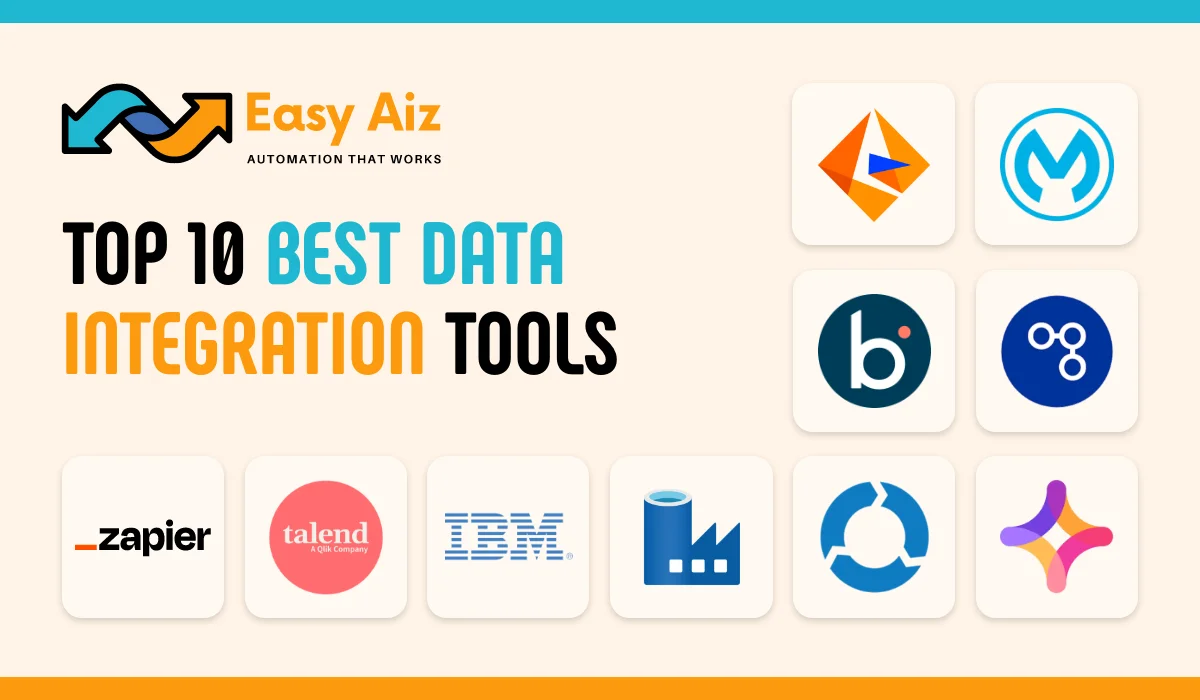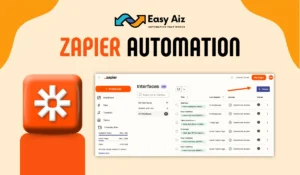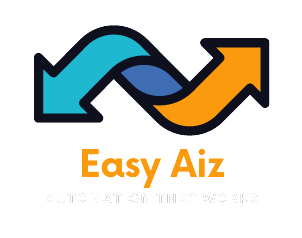Best Data Integration Tools & Software
Data integration is a process of gathering data in one place and unifying them from different pieces. For data integration, we need a tool that integrates our data easily but there is confusion about which data integration software is best from many tools because every tool claims that we are best the question is who is best in data integration? As an Automation agency, we use many tools for our clients so we know which tool is best.
What are Data Integration Tools
Simply as our Data integration definition, tools also have the same definition, Data Integration tools, and Software combine data from different sources and give us these data in a single format and they save you time and effort from loading, filing, and transfiguring Data. And also they help to automate repetitive tasks.
Generally, these tools connect different apps, Databases, and marketing platforms. After using these tools you can boost your business, save time and effort, and also streamline your workflows.
How We Compare
We compare these tools on the basis of some criteria because we want to give you the best integration tool with honest comparison. Here are the points on which basis we compare them.
- Features
- Number of Customers
- Reviews
- Pricing
- Our Experience
List of Top 10 Ten Best Data Integration Tools
Here is the best Data Integration and Best IT Integration Apps
- Informatica
- Talend
- Celigo
- Dell Boomi
- Jitterbit
- SnapLogic
- Zapier
- Microsoft Azure Data Factory
- MuleSoft Aypoint platform
- IBM Infosphere DataStage
1) Informatica
Informatica is an ETL (Extract, Transform, Load) cloud-based tool that simply helps you extract, transform, and load data with the help of its various tools. Informatica is powerful and advanced AI software across any cloud. It is made for the Integration. On G2 Informatica has 4.3 ratings with 104 reviews and on Gartner, Informatica has 4.4 ratings with 388 reviews. Informatica has 5000+ active customers and its total worth is $9.83 billion in 2024. In the Data integration market, there is no better software than Informatice.
Informatica Key features
- Advanced Data transformations
- Business and IT collaboration
- Universal connectivity
- Ease of use
- Automated data and validation testing
- Operations and governance oversight
- Connectivity to Cloud Applications
- Real time data for applications and analytics
- Rapid prototyping, profile, and validation
Informatica Pricing
Its pricing is based on “Pay for what you need”.
2) Talend
As per our research, we took Talend as the second best data integration tool which is now acquired by Qlick. Talend is an ETL open source data integration tool. It supports 1000+ connectors for data transferring. Talend is recognized as a leading provider of Cloud and big data integration. It is considered a Modern data management software. Talend also has a set of tools for better services. Talend Data Integration has 4 ratings with 65 reviews on G2 and 4.1 ratings with 107 reviews on Gartner. It has more than 7250 customers and its total net worth is $2.17 Billion in 2024.
Talend Key Features
- Flexible
- 1000+ Connectors
- Easy user interface
- Wide range of SQL template
- Schema creation and modification
- Supports any data type from any data source to any destination whether on premises or in the cloud.
- Auditing.
Talend Pricing
It has no fixed pricing plans, it also shows four tiers of stitch, Data management platform, Big data platform, and Data fabric. For further details, you can contact with sales.
3) Celigo
There is another cloud-based Integration platform and its name is Celigo. It connects different business applications together and it provides over 300 pre-built SaaS applications for its users. It automates complex integration for both IT and Business users. Everyone can streamline their workflow with Celigo. It also helps you to synchronize data between Cloud-based platforms. Celigo is one of the leading enterprise-wide integration platforms. On G2 Celigo has 4.6 ratings with 481 reviews which is fantastic and 4.3 ratings with 3 reviews on Gartner. Celigo has 1000 customers. There is no recent data available about Celigo’s worth but in 2021 celigo’s total worth was about $100 Million to $500 Million.
Celigo Key Features
- Easy drag-and-drop user interface
- Pre-built integrations
- Custom connectors
- Reusable connectors
- API management
- Data Mapping
- Data Encryption
- Data virtualization
- Flow designer
- Communication protocol
Celigo Pricing
Like other tools, Celigo also doesn’t have open pricing plans you can request a demo on Celigo.
4) Dell Boomi
Dell Boomi is similar to Celigo, it is also cloud based platform that supports different applications for integration and 200 pre-built connectors. Dell Boomi provides a wide range of integrations like API management Data integration and many more. You can also create custom workflows to automate your work process. It is one famous tool in all ETL tools.
Dell Boomi has 4.3 ratings with 309 reviews on G2 and 3.8 ratings with 3 reviews on Gartner. Celigo has more than 2000 customers and its total worth is $4 Billion.
Dell Boomi Key Features
- Security
- Advanced Workflows
- Parallel computing
- Service enablement
- Application Integration
- Data sunchorgnizationo
- Data transformation
- Data visualization
- Data integration
Dell Boomi Pricing
There is no Open pricing plan for Dell Boomi, it offers a free trial. For further information about Dell Boomi pricing plans you can contact Dell Boomi sales.
5) Jitterbit
JItterbit integrates both data and applications. It provides a very easy interface and supports pre-built connectors with the help of these connectors we can our important time. Jitterbit also handles cloud and big data integrations. It provides AI features that are very useful for data integration. Jitterbit migration tasks involve data flow and synchronization. Jitterbit has 4.6 ratings with 352 reviews on G2 and 4.2 rating with 92 reviews on Gartner. It has thousands of customers across the World. Jitterbit annual revenue is currently about $79.5 Million per year.
Key Features
- API Testing
- API monitoring
- Scalability
- App integration
- Data integration
- Data exchange and Data mapping
- Data transformation
- Data security
- Workflow management
- Exception handling
- Third-party integration
Jitterbit Pricing
Jitterbit has three pricing tires Standard, Professional, and Enterprise but pricing is not mentioned as like previous tools for further details you can contact Jitterbit’s sales team.
6) SnapLogic
SnapLogic iPaaS platform which offers data and cloud integration. It is famous for its easy user interface because it provides drag-and-drop features. SnapLogic easily manages data integration workflows and builds data pipelines with 700+ pre-built connectors. Snaplogic can extract data from any source system in any format. It provides good customer service and a helpful community forum. It has 4.3 ratings with 267 reviews on G2 and 4.4 ratings with 115 reviews on Gartner with 750 customers and its total worth is about $1 Billion.
SnapLogic key features
- Reporting and auditing
- Extract, Transform, and Load
- Prebuilt connectors
- Data mapping and Data transformation
- Easy for non-technical users
- Intelligent system
- Low code
- Monitoring and notification
- Data encryption
- Communication protocol
- Security standards
SnapLogic Pricing
Pricing plans are not mentioned if you want their premium plan you can contact SnapLogic’s sales team.
7) Zapier
Zapier is a web-based Automation tool that helps you connect different applications together. It is famous for its wide range of apps that are more than 7000+. Zapier can easily handle your Data integration and streamline workflows. It can save you thousands of hours. Zapier shares data and passes information between different apps and it provides pre-built apps like zapier tables, zapier interfaces, zapier webhooks, and many more which make automation simpler than your expectations. Its user interface is very easy even for non-technical users because of its no-code features. Zapier has 4.5 ratings with 1274 reviews on G2 and 4.8 ratings with 72 reviews on Gartner which shows its quality. It has 3 Million+ customers and its total worth is $5 Billion.
Zapier Key features
- Third-party apps
- API
- Access controls
- Accounting integration
- Application management
- Business process automation
- Data import/Export
- Collaboration tools
- Pre-built connectors
- Email management
- Workflow management
- Multiple data sources
- Usage tracking/analytics
- Task management
Zapier Pricing
Zapier has four pricing plans Free, Professional, Team, and Enterprise based on Task quantity.
Free Plan
A free plan is available forever with two-step zaps, Un limited Zaps with limited functionalities.
Professional Plan
Start from $19.99 per month with 750 tasks to $3389 per month with 2 Million tasks. Everything in the free plan plus Multi-step zaps, unlimited premium apps, webhooks, Email, and live chat support are available in this plan.
Team Plan
Start from $69 per month with 2k tasks to $3,999 per month with 2 Million tasks. Everything in the Professionl plan plus Unlimited users shared workspaces, shared app connections, and premier support is available in this plan.
Enterprise Plan
Contact sales for pricing details. Everything in the Team plus Advanced admin permissions and app controls, Annual tasks limit, Observability, SAML SSO, and designed technical support.
8) Microsoft Azure Data Factory
Azure data factory is a fully managed data integration platform. If you want to migrate data, warehouse data, and transform data there is no better platform than Microsoft Data Factory.
It is also helpful to create and manage complex workflows. Azure Data Factory provides the best security for its users. Those organizations who have already invested in Azure are looking for an Integration platform so Azure data factory is best for them. Microsoft Azure data factory has 4.6 ratings with 77 reviews on G2 and 4.5 ratings with 84 reviews on Gartner. Azure Data Factory has 12,450+ customers.
Key Features
- Reporting and Auditing
- Extract, Transform, and Load
- Scalability
- Drag-and-Drop Interface
- Hybrid data integration
- Integrate with Azure services
- High Security
- Rich data pipeline Arrangement
Microsoft Azure Data Factory Pricing
Azure pricing is complex to understand but you can visit the Azure data factory pricing concept for further details.
9) MuleSoft Aypoint platform
MuleSoft Anypoint Platform is an example of an API-led integration tool, it helps us to connect system, data, and API together. Anypoint Platform is best for organizations to integrate data through different applications. Mulesoft provides a wide range of options to integrate such as API management, data mapping, real time analytics, and more. It provides higher security standards for its customers. Mulesoft includes CloudHub iPaaS, Mule ESB (Enterprise Service Bus), and a unified solution for API management. According to its reviews, this platform may be expensive for very large organizations. MuleSoft Anypoint Platform has 4.5 ratings with 652 reviews on G2 and 4.4 ratings with 95 reviews on Gartner. Anypoint Platform has 12,000+ customers.
MuleSoft Anypoint Platform Key Features
- API Manging and API Monitoring
- API Testing
- Extraction and Transformation Data
- Cloud Data Integration
- Anypoint CLI
- No Code
- Pipeline Management
- Third Party Integration
- Pre-built connectors
- Data Security
- Data Quality Control
MuleSoft Anypoint Platform Pricing
Anypoint platform provides 30 Dat free trial and it has three pricing tiers Anypoint Integration Starter, Anypoint Integration Advanced, and API Management Solution. For further pricing details, you can visit Anypoint platform pricing.
10) IBM Infosphere DataStage
In the last, we have another famous Data Integration tool IBM Infospehere DataStage.It is also an ETL (Extract, Transform, and Load) tool and it also supports ELT (Extract, Load, and transform) integration which mostly deals with larger-scale organizations. IBM DataStage is best at complex data integration and It is also Integrate with leading Cloud and Big data technologies.
It has the capability of connecting systems, data sources, and applications. IBM Infosphere DataStage has 4 ratings with 69 reviews on G2 and 4.5 ratings with 103 reviews on Gartner. It has 5,000+ customers.
IBM Infosphere DataStage Key Features
- Reporting
- Data Transformation
- Data Visualization
- Data Migration
- Data Manipulation
- No-Code Functionality
- Analytics
- Process various formats
- High Security
- Scalability
- Cloud and Big Data Integration
IBM Infosphere DataStage Pricing
Infosphere DataStage provides a free trial without any cost but pricing plans are not openly mentioned for further details you can book a meeting with the IBM Team.
Conclusion
There are many Data Integration tools available in the market because of this it is very hard to choose the best because everyone is claiming that we are the best, and it is totally confusing. To solve this problem we do a fair comparison of Data integration tools and give them a fair position on the basis of reviews, number of customers, features, and our experience. We find the 10 best tools for you Informatica, Talend, Celigo, Dell Boomi, Jitterbit, SnapLogic, Zapier, Microsoft Azure Data Factory, MuleSoft Aypoint platform, and IBM Infosphere DataStage.




